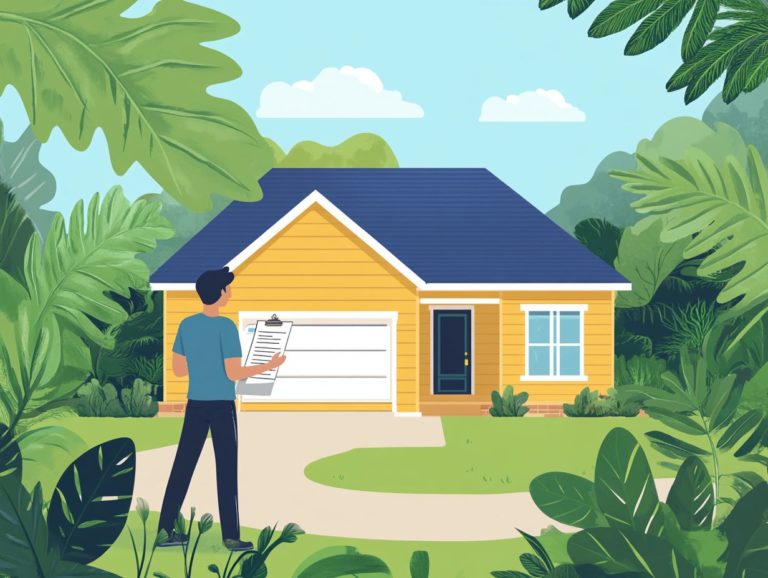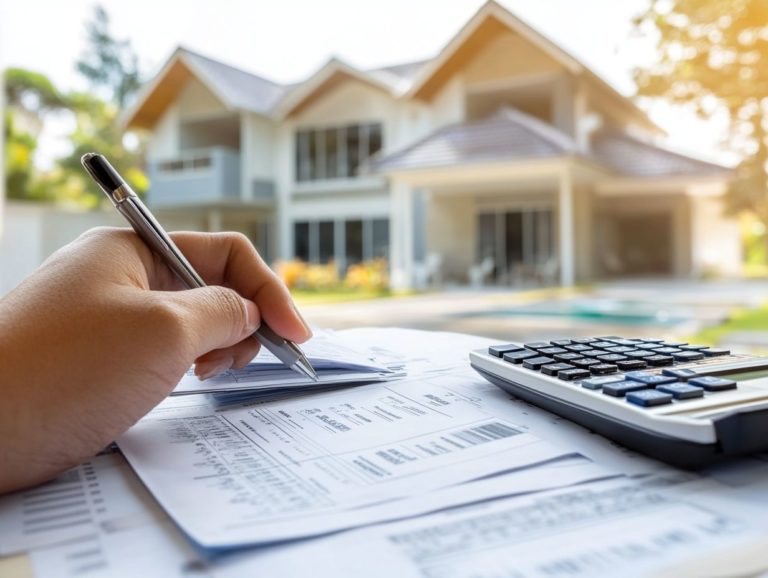When Is the Best Time to Buy a House?
Buying a house is one of the most significant decisions you will ever make. Let s be honest timing can be everything.
Your financial readiness, market conditions, and seasonal trends all play crucial roles in determining the right moment for your purchase. This guide outlines essential considerations, from building your savings and researching the market to negotiating with sellers.
Whether you are a first-time buyer or seeking to upgrade, understanding these elements will empower you to make informed choices and secure your dream home at just the right time.
Contents
- Key Takeaways:
- Factors to Consider Before Buying a House
- Best Time to Buy a House
- How to Prepare for Buying a House
- Tips for Buying a House at the Right Time
- Frequently Asked Questions
- When Is the Best Time to Buy a House?
- Are there specific months or seasons that are better for buying a house?
- What factors should I consider when determining the best time to buy a house?
- Are there any advantages to buying a house during a specific time of year?
- Can I save money by buying a house during a certain time of year?
- Is there a “perfect” time to buy a house?
Key Takeaways:

- Be financially ready! Check your savings and credit score to set your budget.
- Monitor seasonal and economic trends to find the best time to buy a house. These factors affect housing prices and interest rates.
- Prepare for buying a house by building your savings and researching the market.
- This preparation will help you make informed decisions and negotiate with sellers.
Factors to Consider Before Buying a House
When considering the purchase of a home, it is essential to evaluate various factors that influence your financial readiness and the current market conditions.
Understanding these elements can significantly impact your ability to secure a house at a competitive price. As mortgage rates change and real estate prices shift, you must assess your financial situation alongside the prevailing housing market trends.
This preparation not only paves the way for a successful transaction but also equips you to navigate the complexities of the home buying process with confidence.
Financial Readiness
Assessing your financial readiness is a crucial step in the home buying process, especially if you are a first-time buyer. Down payment assistance programs may be particularly beneficial.
Understanding your budget is essential, as it allows you to allocate funds not just for the home s price but also for other important expenses like closing costs and ongoing maintenance.
Having a solid grasp of credit scores is just as vital; these scores will affect your mortgage rates. Typically, higher scores lead to better rates, meaning lower monthly payments for you.
Navigating the variety of mortgage options from fixed-rate loans to adjustable-rate mortgages can feel overwhelming. This is where consulting experienced mortgage professionals becomes invaluable. They can offer personalized advice and explain how interest rates change with market conditions, helping you make informed financial decisions that lead to a successful home purchase.
Market Conditions
Understanding the current market conditions is crucial for you as a homebuyer. With fluctuating prices and shifting housing inventory, staying alert is key to making informed decisions.
When inventory levels dip, competition among buyers intensifies, driving prices up and potentially diminishing your negotiation power. Conversely, during times when more homes are available, you often find yourself in a stronger negotiating position.
This seasonal ebb and flow can significantly influence how favorable purchase prices are, ultimately determining whether you secure a deal that aligns with your financial goals.
Best Time to Buy a House
Determining the optimal time to buy a house requires an understanding of seasonal trends in the real estate market, which can impact housing supply and competitive pricing. For more insights, check out when you should start house hunting.
Many experts, including those from ATTOM Data Solutions and Zonda, indicate that October is a golden opportunity for buyers less competition means better deals!
By carefully timing your purchase, you can enhance your negotiation leverage and uncover the best opportunities the market has to offer.
Start preparing for your home purchase today!
Seasonal Trends

Seasonal trends have a big impact on the real estate market. They can help you find the best times to buy a home.
As the year goes on, factors like weather, holidays, and local events affect home prices and the number of available homes.
For instance, spring usually sees more listings, which means more competition. In contrast, fall and winter often slow things down, resulting in fewer homes and potentially lower prices.
This seasonal change can be your golden opportunity as a first-time buyer. You might be able to negotiate better terms when the market is less crowded.
Strategically timing your purchase during these quieter seasons could be your best chance to snag a great deal.
Economic Factors
Economic factors like the cost of borrowing money and inflation play a big role in deciding when to buy a home. Understanding these changes is crucial for you.
When borrowing costs rise or fall, your monthly payments change, affecting your overall budget for a home. A lower cost might give you more choices, while a higher cost could limit them.
By keeping an eye on these economic indicators, you can make informed decisions and secure better prices when the market favors you.
How to Prepare for Buying a House
Preparing to buy a house requires a thoughtful approach. You need to build your savings while also researching the market extensively.
This groundwork will make your home buying experience smoother. By understanding your finances and the market, you can find homes that fit your needs and budget.
This preparation also makes you more competitive in negotiations, giving you an advantage in your home search.
Building Your Savings
Building savings is crucial for your home buying journey. Focus on down payment assistance and financial readiness.
Start by setting clear savings goals for your down payment. Budgeting apps can help manage your expenses and give you a better view of your income.
Consider creating special savings accounts just for your home purchase to keep those funds safe from daily spending.
Understanding down payment requirements is essential, as they vary based on the type of home and location.
Fortunately, various programs can assist first-time buyers with grants or lower down payment options, making homeownership more attainable.
Researching the Market
Researching the market is essential for you as a home buyer. It helps you find listings that match your needs and budget.
Online platforms provide a wealth of information, from current listings to neighborhood trends.
Attending open houses lets you experience properties firsthand and assess their value.
Working with knowledgeable real estate agents can elevate your experience, offering insights into local market conditions and price changes.
Understanding these elements builds your confidence as you navigate the complex real estate landscape.
Tips for Buying a House at the Right Time

Buying a home can be tricky. A smart approach helps you secure the best deals and negotiate effectively.
Timing is essential. In spring, home prices often rise, and competition increases.
Stay flexible with your strategies. This will give you an edge in a market filled with bidding wars.
With the right tactics, you can land great deals and enjoy your investment for years to come.
Negotiating with Sellers
Negotiating is a crucial skill for home buyers. It helps you get a fair purchase price in today s changing market.
Start by understanding the property’s value. Look at similar homes that have recently sold in the area.
Know what drives sellers. They might be motivated by urgency, financial issues, or personal reasons.
Use market data to support your offers. Being informed makes you a strong contender in negotiations.
Being Flexible with Timing
Flexibility can help you buy a house at a better price. Off-peak seasons, like winter, can reveal hidden opportunities.
During quieter months, there are often fewer buyers, leading to lower prices. This boosts your affordability.
Watch seasonal trends closely. Sellers might be willing to consider lower offers when competition is low.
This strategy empowers your purchasing decisions and aligns with your financial goals.
Frequently Asked Questions
When Is the Best Time to Buy a House?
The best time varies for everyone. It s when you feel financially and personally ready to become a homeowner.
Are there specific months or seasons that are better for buying a house?

Yes, certain months can be better. Fall and winter usually see lower prices and less competition.
What factors should I consider when determining the best time to buy a house?
Consider your financial stability and the current real estate market. Assessing these factors helps you make informed decisions.
Are there any advantages to buying a house during a specific time of year?
Yes, buying during the off-season can mean lower prices and less competition. In peak seasons, you may find a wider selection of homes.
Can I save money by buying a house during a certain time of year?
You can save money by timing your purchase. For example, homes are often cheaper in winter due to lower demand.
Is there a “perfect” time to buy a house?
There s no perfect time. The best time is when you feel ready to take on homeownership responsibilities.






